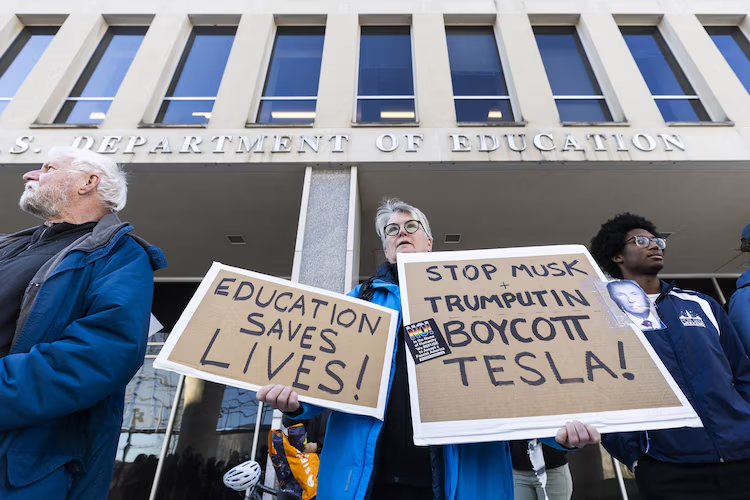Supporters of the Department of Education protest outside the main offices after the firing of 2,000 employees, after a signed executive order to shrink the department. Photo courtesy of ABC News.
OLLIE FITZGERALD | STAFF REPORTER | ofitzgerald@butler.edu
President Trump signed an executive order to attempt to eliminate the federal Department of Education (DOE) in early March. The DOE provides resources to the nation’s schools, including financial aid for college students, enforcement of civil rights in schools and ensuring equal access to education for all students. Butler’s College of Education (COE) sends student teachers into local public schools that typically rely on assistance from the DOE, meaning many professors and students share concerns for public education going forward.
The goal of the executive order was to dismantle the DOE and return power over education to states, similar to the overturning of Roe v. Wade to return reproductive rights to state legislators. The DOE cannot officially close without congressional approval. In the wake of the executive order, around 2,000 employees were fired. Several divisions have started to close or move, including the Federal Student Aid department. There is uncertainty about what the future of the DOE might hold.
Erin Garriott is a senior lecturer who teaches disability and special education classes at Butler’s COE but has also taught in local public schools and has a hearing disability herself. Federal special education law exists under the DOE as the Individuals with Disabilities Education Act and the Office of Special Education and Rehabilitative Services.
Garriot explained how the DOE’s role and this act are crucial to special education and equal access to learning.
“[The act] outlines what we call an individualized education plan, [or IEP], for students,” Garriott said. “So if a student has a disability, the federal law outlines what must be part of [their unique plan], and requires [their] accommodations, providing security that our kids will get the things they need.”
Senior elementary education major Allison McElroy is currently student teaching with first-grade and multilingual learner students. After she graduates, she hopes to teach English as a second language. McElroy’s English learner students are protected under the same Title I funding that disabled students and low-income students are.
McElroy said that it is scary going into education during this time, especially since there are already outstanding problems. However, she is hopeful that Congress or the Supreme Court will veto the executive order.
“There’ve been lots of things that I did not expect to happen in this administration, so I really don’t know [what the future holds], but I am hopeful,” McElroy said. “It’s hard though because I’ve heard people say, ‘It’s just going to the states,’ but there are federal things in place to protect all students that certain states might not keep in place, especially in [states like] Indiana.”
Elementary education professor, Brooke Harris Garad, further emphasized the importance of federal Title I funding, which impacts many low-income elementary schools in the Indianapolis area. This funding covers costs such as free and reduced lunch plans.
The COE has two “lab schools” that student teachers get sent to. Harris Garad explained that the schools directly rely on Title I funding to operate.
“Our two laboratory schools are serving a high proportion of lower-income students and families,” Harris Garad said. “Something like cutting for Title I funds could directly impact the students that we work with and the experiences of our student teachers.”
While no one in the College of Education knows exactly what the future holds for the DOE, Garriot hopes that there will be good people who continue doing what the DOE has previously done in the case of its removal.
“I just think there are some non-negotiables when it comes to taking care of others,” Garriot said. “It shouldn’t feel radical to prioritize the kids who need us the most.”



